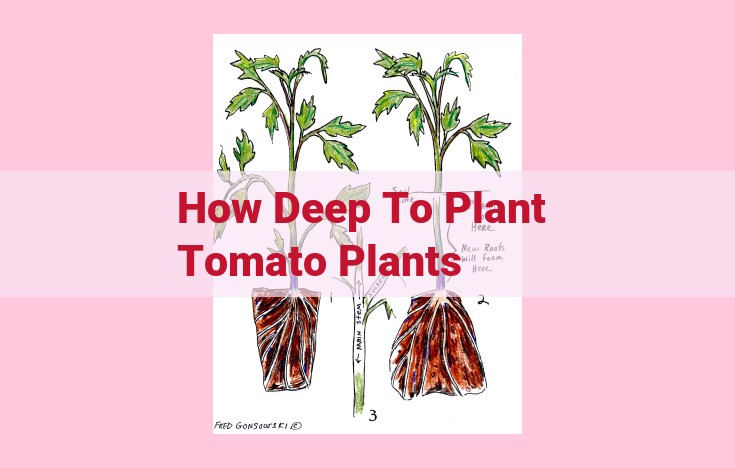Mastering The Art Of Tomato Planting Depth For Maximum Growth And Yield

How Deep to Plant Tomato Plants:
To optimize tomato plant growth and yields, plant them at the correct depth. Consider the soil type and root system development. Plant tomatoes so that the soil line covers up to the first set of true leaves. This allows for proper root development and minimizes the risk of disease susceptibility. Avoid planting too deeply, as it can stunt growth and lead to root rot.
Factors Influencing Plant Growth and Development
Understanding the factors that influence plant growth and development is crucial for successful gardening and farming. These factors can be broadly categorized into abiotic and biotic components.
Abiotic Factors:
Environmental conditions play a significant role in plant health and productivity.
- Soil Type: The composition and texture of the soil impact root development, water availability, and nutrient uptake.
- Temperature: Plants have optimal temperature ranges for growth and survival. Extreme temperatures can stress or damage tissues.
- Climate: Precipitation, humidity, and wind patterns influence plant growth and water requirements.
- Water Availability: Water is essential for photosynthesis, nutrient transport, and cell division. Drought conditions can stunt growth or even lead to plant death.
Biotic Factors:
Interactions with other living organisms also influence plant development.
- Root System Development: A healthy root system anchors plants, absorbs nutrients, and stores energy.
- Nutrient Uptake: Plants require specific nutrients for growth and development. Nutrient deficiencies can lead to stunted growth or yellowing leaves.
- Disease Susceptibility: Plants can be susceptible to diseases caused by fungi, bacteria, or viruses, which can impact growth and yield.
- Yield: Factors such as genetic potential, cultural practices, and environmental conditions influence the quantity and quality of plant yields.
Seeking Expert Guidance: The Importance of Consulting Professionals for Plant Care
As aspiring plant enthusiasts, navigating the world of plant growth and development can be an uncharted territory, filled with questions and potential pitfalls. While the internet and gardening books provide a wealth of information, nothing beats the practical wisdom of experienced professionals.
Gardeners, farmers, and horticulture experts possess a deep understanding of the intricate factors that influence plant health and productivity. They have witnessed firsthand the challenges and triumphs of plant cultivation, enabling them to provide sound advice tailored to your specific needs.
Consulting with professionals allows you to tap into their expertise and benefit from their seasoned knowledge. They can help you identify the optimal soil conditions, determine the best planting techniques, and diagnose potential problems. Whether you’re a novice gardener looking to create a thriving garden or a seasoned farmer seeking to increase crop yields, seeking professional guidance can elevate your plant care practices and maximize your success.
Here are some specific benefits of consulting with plant professionals:
- Accurate Plant Identification: Experts can help you correctly identify your plants, ensuring you provide them with the appropriate care.
- Customized Plant Care Plans: They can develop personalized care plans tailored to your plants’ unique requirements, considering factors such as light conditions, temperature, and soil type.
- Pest and Disease Management: They can provide guidance on preventing and treating pests and diseases, helping you protect your plants from damage.
- Plant Nutrition Advice: Experts can recommend the appropriate fertilizers and soil amendments to ensure your plants receive the essential nutrients they need to thrive.
- Plant Selection and Placement: They can help you select the right plants for your climate and garden conditions, ensuring optimal growth and aesthetic appeal.
Remember, investing in expert plant care advice is an investment in the health and productivity of your plants. By seeking guidance from knowledgeable professionals, you can optimize your gardening practices and reap the rewards of a thriving, vibrant landscape.
Organizations: A Wealth of Plant Growth Knowledge at Your Fingertips
When it comes to cultivating thriving plants, accessing reliable information is paramount. Fortunately, a plethora of organizations, such as plant nurseries, gardening websites, and publications, stand ready to provide you with an abundance of valuable resources.
From local plant nurseries, you can glean expert advice on selecting the right plants for your climate and soil conditions. Their knowledgeable staff can guide you in choosing species that will flourish in your specific environment, ensuring a healthy and productive garden.
Gardening websites, on the other hand, offer a treasure trove of information at your fingertips. Reputable websites provide comprehensive articles, detailed plant profiles, and tips from experienced gardeners, empowering you to make informed decisions about plant care.
Finally, publications such as gardening magazines and books offer in-depth insights into the fascinating world of plants. Whether you’re a novice or a seasoned pro, these authoritative publications provide a wealth of knowledge on plant growth, care, and troubleshooting, empowering you to master the art of cultivating beautiful and thriving gardens.
Research: The Key to Unlocking Optimal Plant Growth
Staying abreast of the latest scientific research is crucial in elevating your plant cultivation practices. Through continuous learning and experimentation, you can optimize growing conditions, identify optimal nutrient combinations, and stay informed about innovative techniques.
Imagine embarking on a journey to transform your garden into a thriving oasis. By immersing yourself in research findings, you uncover the secrets to maximizing seed germination, promoting robust root growth, and achieving bountiful harvests.
Scientific research has revealed the profound impact of microclimate optimization. Understanding the intricacies of temperature, humidity, and airflow empowers you to create microenvironments that foster plant health and productivity.
Embrace the wealth of knowledge available through peer-reviewed journals, scientific conferences, and collaborations with experts. Engage with researchers who are dedicated to deciphering the complex interactions that govern plant growth. Their insights will guide you in making informed decisions to enhance your gardening endeavors.
By harnessing the power of research, you become an empowered cultivator, equipped with the tools to nurture thriving plants, maximize yields, and experience the joy of successful gardening.